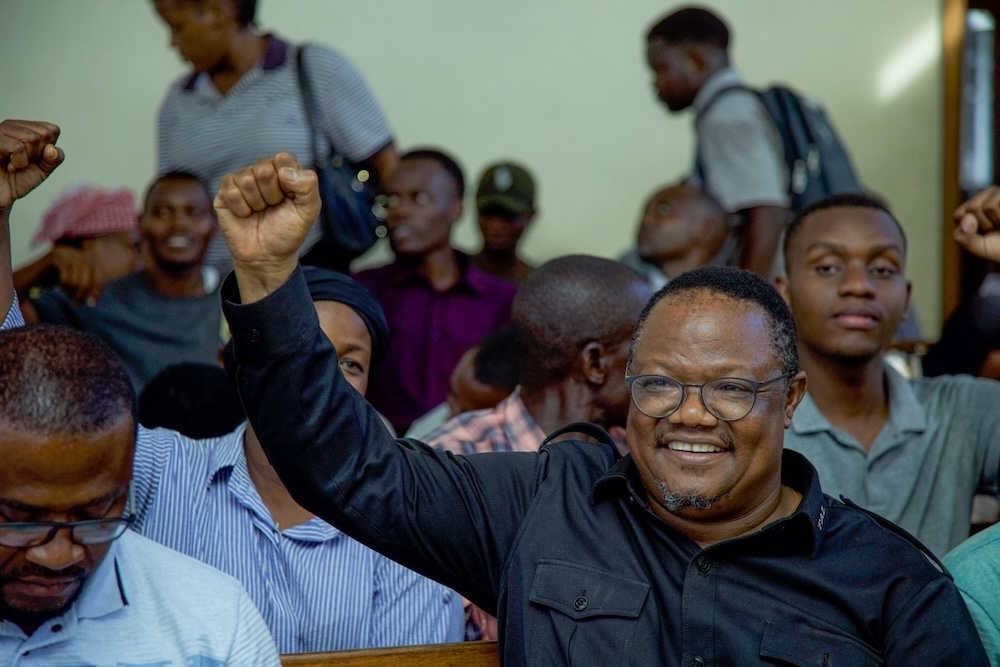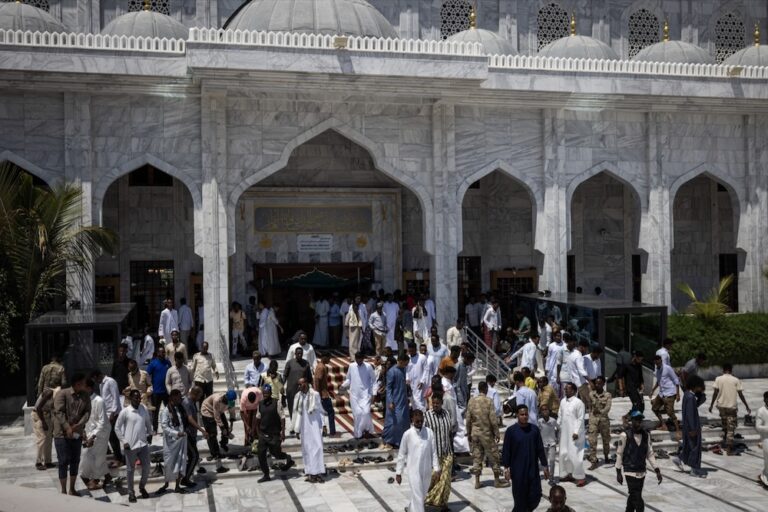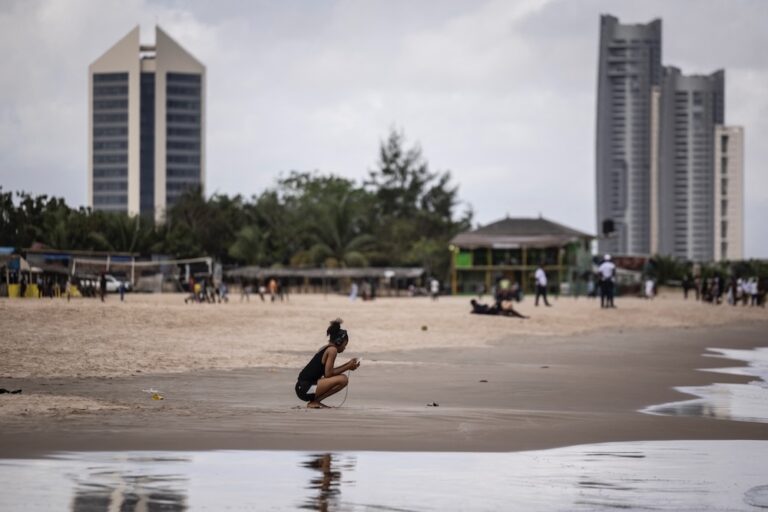Africa in April: A free expression and civic space round-up produced by IFEX's Regional Editor Reyhana Masters, based on IFEX member reports and news from the region.
April 2025 marked a troubling escalation in the suppression of press freedom and political dissent across Africa, with governments employing increasingly authoritarian measures to silence opposition voices and independent journalism.
Trouble in Tanzania
The arrest on 9 April of Tundu Lissu, leader of Tanzania’s main opposition party Chadema, was more evidence of a steady increase in political repression seen ahead of the country’s next general elections – scheduled to take place sometime this year.
After addressing a political rally in Mbinga, in the south west part of the country, Lissu was charged with publishing false information and treason following his public calls for an election boycott unless fundamental electoral reforms are implemented. The charges carry the risk of the death penalty and serve not only as a direct attack on opposition leadership but as a warning to civil society, independent media, and ordinary citizens demanding government accountability.
President Samia Suluhu Hassan’s early days held the promise of a moderate leadership pushing positive reforms as she restored civic rights – lifting media bans, and opening political spaces. By wielding cybercrime laws and treason charges as political weapons, her administration is rapidly erasing hopes that her leadership would mark a break from the dark legacy of repression under her predecessor, John Magufuli. With the space for free expression and democratic participation shrinking, the legitimacy of Tanzania’s forthcoming elections is already under severe strain, risking both domestic instability and international condemnation.
Repressive legislative assault in Zimbabwe
Zimbabwean journalist Blessed Mhlanga has been detained since 24 February for interviewing former war veteran and senior member of the ruling Zanu-PF party Blessed Geza, who has vocally opposed the proposed extension of President Emmerson Mnangagwa’s presidential term. Mhlanga is being charged with allegedly transmitting messages deemed to incite violence – a move widely seen as politically motivated and aimed at stifling critical voices.
His extended detention – over an unaired interview – underscores the growing weaponisation of the law against journalists in Zimbabwe, where authorities increasingly conflate independent reporting with criminal conduct in a broader clampdown on press freedom.
This is part of a broader assault on Zimbabwe’s civic and political space, which has now been deepened by President Mnangagwa’s signing of the Private Voluntary Organisations Amendment Act on 11 April. The government narratives claim the law is in alignment with international anti-money laundering compliance standards as contained in the Financial Action Task Force (FATF) regulations. However, its real impact is far more insidious as it grants government authorities sweeping powers to deregister NGOs, seize assets, and criminalise dissent under the guise of protecting the sovereignty of the country.
Uganda: Rising violence sparks coalition for media protection
Violence against journalists continues to rise in Uganda, with an increase in attacks by both state and non-state actors. The brutal assault on Bukedde TV reporter David Musisi (Karyankoko) on 4 April is more evidence of this disturbing trend. Musisi was critically injured – struck by a tear gas canister allegedly fired by police – while covering a public protest over power outages in Mukono District.
#Uganda 🇺🇬 Human Rights Network for Journalists-Uganda expresses deep concern over brutal attacks on journalists, citing recent incident where Bukedde TV's David Musisi was beaten into a coma by police officers. buff.ly/BKzjnSw #JournalistSafety
This attack is part of a widening pattern of violence and intimidation according to the Human Rights Network for Journalists-Uganda (HRNJ-Uganda). Earlier attacks on David Musisi, Ibrahim Miracle, Chris James Woo, Solomon Okollo, Eman Yonah Oluk, and Kule Robert reflect this deepening crisis of violence against journalists.
In response, an Alliance Against Electoral Violence has been formed that includes the Uganda Law Society, and representatives from government, media, and civil society, including HRNJ-Uganda. They seek to address the issue through an approach that includes advocacy, legal aid, education, and institutional reform. In their declaration, the alliance members committed to:
- Promoting peaceful elections through advocacy, education, and community engagement
- Supporting victims of electoral violence through legal aid, counselling, and other forms of assistance
- Holding perpetrators accountable through robust investigations, prosecution, and sanctions
- Strengthening institutional capacity to prevent and respond to electoral violence, including through training and capacity building for law enforcement, judiciary, and electoral officials
Intensified crackdown in Burkina Faso
Burkina Faso’s military junta is intensifying its crackdown on press freedom, employing a disturbing pattern of repression that includes forced conscription of journalists, dissolution of media associations, suspension of news outlets, and abduction of activists.
In the most recent incident, three prominent journalists – Guezouma Sanogo, Boukari Ouoba, and Luc Pagbelguem – disappeared in late March 2025 after criticising the junta’s media restrictions. Ten days later, a video surfaced showing them in military uniforms, raising serious concerns about their forced conscription into the army. This mirrors previous incidents where journalists critical of the junta were abducted and later reappeared in military service, such as the confirmed conscription of Serge Atiana Oulon, Adama Bayala, and Kalifara Séré in October 2024.
In brief
- Ethiopian police raided the offices of the independent news outlet Addis Standard, detaining three managers and confiscating electronic devices without formal charges.
- On 15 April, Congolese journalist Émérite Amisi Musada was abducted in Bukavu, in the Democratic Republic of Congo, tortured, and found four days later near Lake Kivu, another example of the extreme dangers faced by journalists reporting on the conflict in eastern DRC.
- At the Global AI Summit on Africa, held in Kigali in early April, leaders acknowledged that while AI can unlock major advances across the continent, it has equal potential to become a powerful weapon against freedom of expression – entrenching surveillance, censorship, and digital exclusion across the continent. Without strong, Africa-centred governance frameworks, the very technologies hailed as transformative could instead deepen inequalities and enable new forms of digital repression.
- During the Southern Africa Development Committee (SADC) Communication, Awareness, and Visibility Strategy validation workshop in Johannesburg, in April, Dr. Tabani Moyo, executive director of IFEX member the Media Institute of Southern Africa, presented on “Emerging communication trends, technologies, and changing media consumption patterns in the SADC region”, highlighting the need for a balanced communication approach that combines traditional media like radio with digital platforms to effectively reach diverse audiences across the region.



